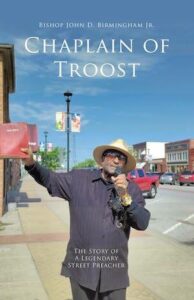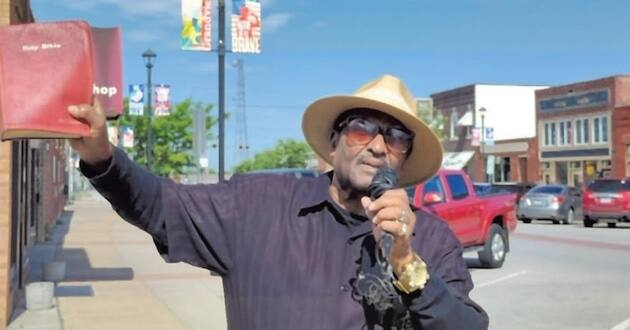I’ve been blessed to know Bishop John Birmingham for over twenty years. His tireless work in Kansas City’s urban core (which we have written about) has been an inspiration to generations of pastors and he’s not done.
I was excited about the release of his book “Chaplain of Troost” because, in addition to allowing me to know “the man” better, it offers a glimpse into a specific time-stamp on our city.

Birmingham, born the eldest of fourteen children, was raised by a devoted mother, Mary, and an industrious father, John Daniel. His character was influenced by his mother’s model of leading a life committed to God. And his church.
Birmingham avoided the life the of drugs, alcohol, sexual promiscuity and violence that caught up many of his friends even though he grew up in the same difficult surroundings. This book considers how his faith and moral grounding from his parents helped him to be spared a life of devastation.
Early on, at barely 15 years old, Birmingham’s calling to share the Gospel started when he would stand on Kansas City’s street corners preaching. Even by that early age, he had personally seen it all and felt a need to confront sin, hardship and loss. Birmingham discovered his actual calling, though, on Troost Avenue, he refers to as “the most sin-shacked section of the city.”
He went on to graduate from Western Bible College and obtain a doctorate in theology and Christian counseling.
The narrative of John’s story revolves on the change he saw on Troost, the ministries he’s founded or partnered with, and the redeeming power of the blood of Christ.
He didn’t give himself the moniker. Recognizing Birmingham’s unselfish work in restoring hope where the police had failed, Mayor Charles B. Wheeler dubbed him the “Chaplain of Troost” in 1977.
Eye-opening and moving are Birmingham’s evocative depictions of youngsters begging for food, the cover for prostitution provided by the Yum Yum Club, and the daily hardships of the neighborhood. In every chapter, his inimitable voice strikes forcefulness and passion.
Rev. Birmingham, why don’t you forget about Troost, man, it’s nothing down there but cut throats. Man, them folk will kill you without a second thought.”
But Bishop Birmingham just didn’t battle the sin on Troost and other nameless streets with similar challenges.

Birmingham
In one compelling story, he recounts the “cold-hearted” words of a Black preacher who attempted to persuade him away from his work. He quotes the preacher as saying, “Rev. Birmingham, why don’t you forget about Troost, man, it’s nothing down there but cut throats. Man, them folk will kill you without a second thought.” But the preacher went on, enticing Birmingham to an easier life, saying, “Just get you a nice little church, develop a “whoop” (a sing-song type of preaching common among many African-American preachers), lay back on a nice salary, and get you a Cadillac.
The preacher told the young Birmingham there was “no hope” for the people down on Troost.
Bishop Birmingham, though, ignored the misplaced and unbiblical advice. He would go on to serve the area for more than 45 years.
The untold numbers whom Bishop Birmingham counseled and led to salvation will never be known. He recounts many of their harrowing stories in a way that only John Birmingham can do.
In reading his personal story I was encouraged. Today, as the area is on the upswing and pride returns to many of its residents, there are no-doubt still challenges. But it wouldn’t be where it is right now without the tireless and faithful commitment by the “Chaplain of Troos.”
In one passage, Bishop Birmingham rhetorically asks the question: “Is there any good thing on Troost”
“Yes!” he answers. “God is looking beyond the wicked exter0or and seeing the needs….and looking at the souls coming forth from bondage…washed in His redemptive blood.
Bishop Birmingham continues to be a regular on the streets calling people to Christ. He continues to advocate for ending violence in Kansas City and recently led a Peace Walk to call witness to violence on the city’s urban streets. He nad his wife Carolyn continue to have a burning desire to see the lost come to Christ.
He covers it all in “Chaplain of Troost” and provides evidence of the power of faith and the resiliency of the human spirit, not only the account of a man’s ministry. Bishop John Birmingham sees that no life is too far gone for saving.
Sales of the book funds the outreach ministries still taking place on Troost.
–Dwight Widaman | Editor of Metro Voice








